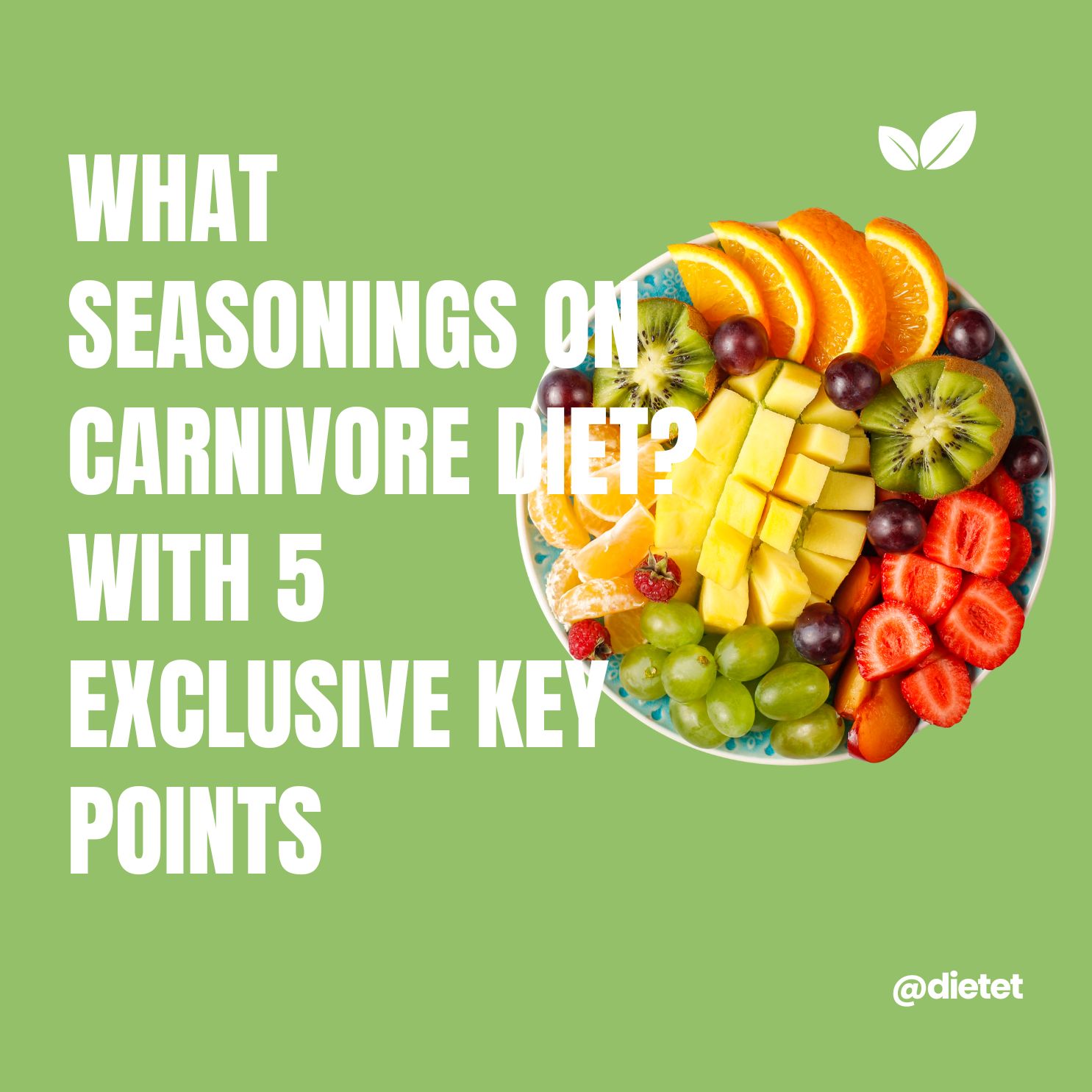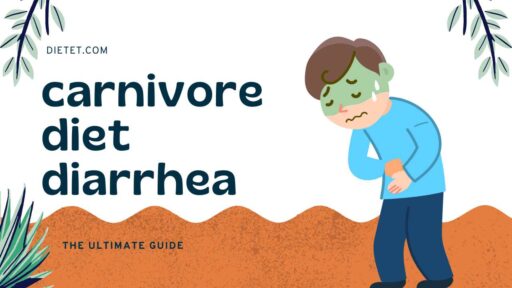What Seasonings On Carnivore Diet?
Seasonings are the unsung hero on any culinary stage, including that of the carnivore diet. Their role? To breathe life into the show-stopper act: your meat-centric meals. Picture this – a beautifully cooked steak, or succulent roasted chicken. Mouth-watering, right? Now imagine those without the magic that seasonings sprinkle. Not quite the same. That’s the power seasonings hold.
But wait, before you reach out to your kitchen cabinet for that seasoning jar, remember, that not all seasonings are carnivore diet-friendly. However, don’t let that hold you back. Plenty of delicious, carnivore-approved options are waiting to add a zestful punch to your meals.
“Seasonings aren’t merely about adding flavor to your meals. They are about enhancing the inherent taste of the star ingredient while adding their characteristic spin to the mix while keeping within the carnivore diet boundaries.”
So gear up to sail into the high seas of flavor! We have charted a course to the world of carnivore diet-friendly seasonings, to help you banish blandness from your plates for good. Let’s explore, shall we?
Read more about the Carnivore Diet

How can I make my carnivore diet more flavorful?
Perfecting the art of seasoning on a carnivore diet is a game-changer in preparing your meat-based meals. While keeping to strict carnivore principles, the use of certain seasonings can enhance the flavor of the meat and contribute to your health. Let’s explore this together.
Cayenne pepper, salt, and black pepper are your first port of call. These basic seasonings are not just flavor enhancers but also carry their health benefits. For instance, cayenne pepper adds that extra bite and has been linked to boosting metabolism while salt, in moderation, plays a vital role in maintaining electrolyte balance.
Say hello to the wonders of garlic powder and onion powder. Spices like these can level up your carnivorous meal by adding rich, savory depth to your meat dishes, without straying away from your diet principles. However, ensure these do not contain hidden sugars or preservatives.
If herbs are more your style, why not incorporate rosemary and thyme into your meat preparation? These can bring a fresh, aromatic twist to your meals, enlivening the taste of your meats like steak or wild game. Moreover, many supporters of the carnivore diet recommend these herbs as part of the diet plan.
However, you need to be mindful that certain herbs and spices may introduce anti-nutrients into your diet or even cause digestive issues. To get around these potential pitfalls, consider using fresh herbs, and avoid dried and powdered spices if possible.
To wrap it up, even within a carnivore diet, an array of seasonings and herbs can be utilized to provide flavorsome meals without compromising your dietary goals. Bon appétit!
Are there any spices that are not allowed on a carnivore diet?
Indeed, there are several seasonings and spices that you may want to reconsider when following a carnivore diet. The key concern here is the intake of anti-nutrients and the potential health issues they may cause. Oxalates, for instance, can cause significant health problems, such as a weakened immune response, and kidney stone development, and potentially contribute to fungal infections in the gut.
How can you keep these unfavorable elements off your plate? Well, it’s all about choosing your spices and herbs wisely. Opting for seasonings packed with anti-nutrients might be counter-productive on a carnivore’s menu. Commonly used spices that are high in anti-nutrients include cinnamon, nutmeg, and allspice. Therefore, these might be best avoided.
Get more Diet guides & tips from us: Dietet.com
Key Seasonings on a Carnivore Diet
Yet, fear not, as plenty of spices not only inject fantastic flavor into your meals but are also consistent with your dietary needs. You can’t go wrong with the classic black pepper or salt, which are often a staple in any carnivore’s pantry. Onion and garlic powder, although processed forms of plant foods are also often used thanks to the robust taste they offer. However, always use it in moderation to avoid any potential digestive issues.
Herbs like rosemary, thyme, and dill are not just allowed but rather encouraged. They contain minimal anti-nutrients and can bring out a whole new flavor profile in your meats. You can even experiment with cayenne pepper if you enjoy a fiery kick to your meals.
Fair warning, though, you should steer clear of any spices or seasonings known to have hidden sugars or can potentially lead to digestive problems. And it’s not just about what the herbs bring in the flavor department that matters, but also how they’re prepared and incorporated into your meals.
The Dairy Dilemma
You’d rightly think that carnivore diet followers can gorge on all kinds of dairy products but tread lightly when it comes to lactose-rich dairy like soft cheeses, milk, and yogurt. These can present difficulties if your body struggles with lactose digestion. So, choose your dairy carefully, remembering that the carnivore diet is mainly about meat and eggs.
By carefully selecting your herbs and spices, you can dramatically enhance the taste of your meals while ensuring they fall within the guidelines of the carnivore diet. Just be mindful of the potential risks, and enjoy your journey towards a flavorful carnivorous lifestyle!
Is it possible to use sauces for seasoning on a carnivore diet?
- Many commercial sauces contain hidden sugars and plant-based ingredients that are not suitable for the carnivore diet.
- Home-made sauces using carnivore-approved ingredients such as animal fats and organ meats can be a functional way to add flavor to your meals.
- Sauces made from dairy products are grill-safe on the carnivore diet, provided you don’t have a negative reaction to dairy. Butter-based sauces or cream sauces could work well.
- Spices and herbs like garlic, thyme, dill, and basil can be included in homemade sauces for additional flavoring.
- It’s crucial to check the ingredient list of any pre-made sauces you buy to avoid unwanted additives like sugar, grains, or legumes.
- You can use sauces to add trace minerals and electrolytes to your carnivore diet, which are crucial for health and well-being.
- Try using bone broths as a base for your sauces, they’re nutrient-dense and carnivore-diet-approved.
- Sauces can increase the palatability of organ meats, which are a key part of the carnivore diet but can be difficult for some people to enjoy.
Choosing Organic and Quality Seasonings
You might be asking, “What’s the fuss about organic seasonings?” Well, allow us to shed some light on that for you. Opt for seasonings certified by USDA Organic whenever possible. Why, you ask? Firstly, these seasonings cut down on your exposure to potentially harmful substances such as synthetic pesticides, genetically modified organisms, and artificial preservatives commonly used in conventional farming.
Another notable benefit is that organic seasonings often taste better, thanks to healthier, more naturally nourished soil in which the herbs and spices are grown. This richness in flavor can create a delightful enhancement to your carnivore diet dishes, even lending them an extra touch of gourmet appeal. Who wouldn’t want that?
Contamination Considerations
While seasonings can add pizzazz to your carnivore diet, there can be a downside. A 2013 study by the FDA showed that 12% of spice shipments were contaminated with harmful pathogens such as Salmonella, or were infested with filth like insect parts or animal hair. Sure, it sounds gross, and it’s certainly something we should try to avoid in our diet. Therefore, sourcing high-quality, reputable seasonings is crucial.
Enhancing Metabolism and Reducing Inflammation
A carnivore diet already goes a long way in boosting your metabolism, but guess what can give it an extra push? You guessed it, seasonings! Certain spices like cayenne pepper, cinnamon, and ginger are known to support and enhance metabolic rate. And that’s not all; seasonings such as turmeric and rosemary are lauded for their anti-inflammatory properties, keeping inflammation at bay while you relish your all-meat diet.
So, next time when you think of seasoning your scrumptious steak, remember that you’re not just adding flavor, you’re also stepping up your health game. And honestly, isn’t that a win-win?
Are there any health benefits to the seasonings allowed on a carnivore diet?
Certainly! There are indeed substantial health benefits to using seasonings in a carnivore diet. While the primary aim of these seasonings and herbs is to enhance the flavor profile of your carnivore meals, some of these seasonings pack a surprising health punch.
Cayenne pepper, for instance, isn’t just there to add a kick to your dishes. It contains capsaicin, a compound known for its potential benefit in boosting metabolism and can also aid in reducing hunger. This can help you maintain an optimal weight.
Salt isn’t just about enhancing flavor either. It plays a crucial role in maintaining trace minerals and electrolyte balance in the body, which is especially critical for those on a carnivore diet, as they may not get these minerals from other sources.
Seasonings like garlic and onion powder also offer health benefits. Garlic has been acclaimed for its potential anti-inflammatory properties and also supports cardiovascular health. Onion, on the other hand, might aid digestion and help in maintaining good gut health.
Rosemary and thyme, while adding a fragrant, earthy flavor profile to your meat, are also believed to have antioxidant properties. These antioxidants can help to combat oxidative stress in your body, aiding in overall health and wellness.
However, keep in mind that while these seasonings and spices offer health benefits, the primary nutritional focus should still be on the meat in this diet. The seasonings are an added bonus, not a primary source of nutrition.
Can I use butter or other fats to season my meats on a carnivore diet?
| Fat Source | Used For | Notable Benefits |
| Butter | Grilling, Sautéing Meat | High Smoke Point, Buttery Flavor |
| Tallow | Frying, Roasting | Highest Smoke Point Among Animal Fats |
| Lard | Baking, Frying | Medium Smoke Point, Neutral Flavor |
| Duck Fat | Roasting, Frying | Rich Flavor, Medium Smoke Point |
Utilizing Carnivore-Approved Condiments
Yes, even on a carnivore diet, you do have options to zap your meals with extra lip-smacking flavor. Condiments like mustard, hot sauce, and vinegar can top-mingle with your meats, adding an appetizing layer of tang and heat. But remember, not all condiments are a green light. Many are riddled with sugars, artificial additives, and unwanted calories that somehow get past your attention. As you pick your condiments, it’s wise to scrutinize the ingredient list beforehand. You are, after all, what you eat.
The Beauty of Broths and Stocks
To further pique your palate, introducing broths and stocks to your carnivore diet wouldn’t go amiss. Not only do they pack tons of flavor, but they also offer nutrition that could be missing from your all-meat menu. Bone broth is a perfect example—you’ll use it as a base for sauces, use it to tenderize tough cuts of meat, or even sip it on its own like tea. It’s a rich source of collagen which leads to healthier skin and joints in the long run. Additionally, it fosters gut health, aiding digestion, preventing inflammation, and boosting immunity. So don’t just toss away those bones next time.
The Verdict on Sea Salt and Pepper
A table isn’t a table without the timeless duo—salt and pepper. And why should it be any different for your carnivore diet? Salt isn’t just for taste; it replenishes essential electrolytes, aids hydration, and assists nerve function. Sea salt, in particular, as compared to table salt, is unprocessed, immune to additives, and brimming with trace minerals. Conversely, pepper, a seemingly trivial sprinkle, shows impressive anti-inflammatory properties and enhances nutrient absorption. Hence, these two are ideal seasonings albeit to be used in moderation.
The Allure of Herbs
Experimenting with fresh herbs like rosemary, thyme, and parsley, or dried herbs like oregano and dill, can open a whole new arena of taste, aroma, and color to your meat dishes. It enhances the overall sensorial experience of your meals. Sure, it might stir a mini-debate among carnivore diet purists about the plant-versus-animal conflict. Yet, for the sake of variety, and given that the consumption is minimal, herbs can be a gastronomic godsend, not to mention the additional health benefits many herbs provide.
Sourcing Your Seasonings—The Smart Way
It’s no surprise the quality of the seasonings you choose will affect the quality of your result—the meaty feast. Thus, consciously picking natural, organic, and quality seasonings void of artificial flavors and contaminants will be your best bet. It might seem trivial, but a 2013 study by the FDA revealed that 12% of spice shipments were contaminated with harmful pathogens or even filth. Yes, you heard right! The last thing you want to do is season your succulent steak with something undermining your health. So, invest in a reliable source, always.
Final Thought
personal and often influenced by individual health goals and lifestyle. Adopting a carnivore diet necessitates a particular focus on meat-based sources of nutrition. However, the interest in maintaining flavor and appeal can provoke questions regarding the appropriate seasonings. By steering clear of plant-based materials and focusing on animal-based nourishment, complete with organic and quality seasonings, your carnivore diet can be as savory as it comes.
During this journey, you might need to experiment a bit to discover your optimum spice blend. Many have found beauty in simplicity—sea salt, black pepper, and various animal fat-based broths can enhance the flavor profile of your dishes significantly and align perfectly with this diet’s principles.
However, it’s crucial to remember taking a one-size-fits-all approach to diet often falls short of addressing individualized needs. Your health should always be a top priority. This is especially important if you have underlying health conditions or specific dietary requirements. Therefore, it’s advisable to consult a dietitian or nutrition expert before diving headfirst into the carnivore diet.




